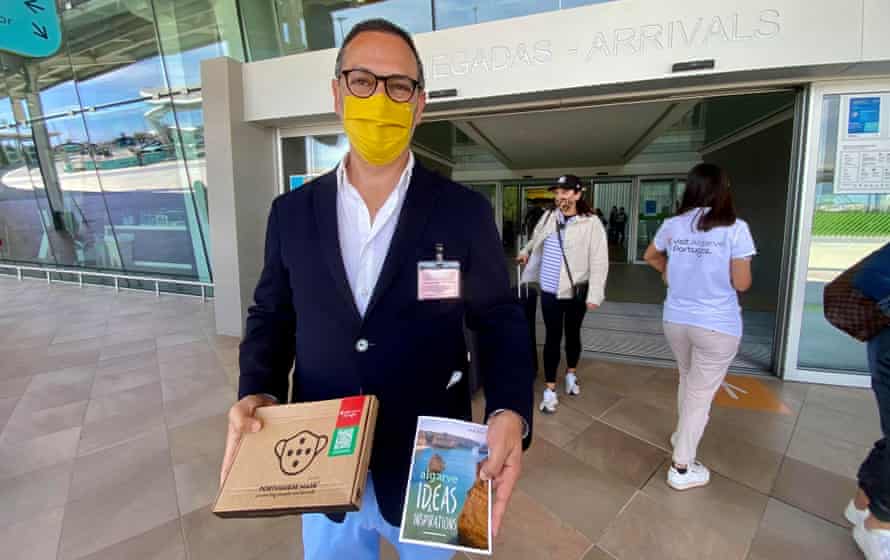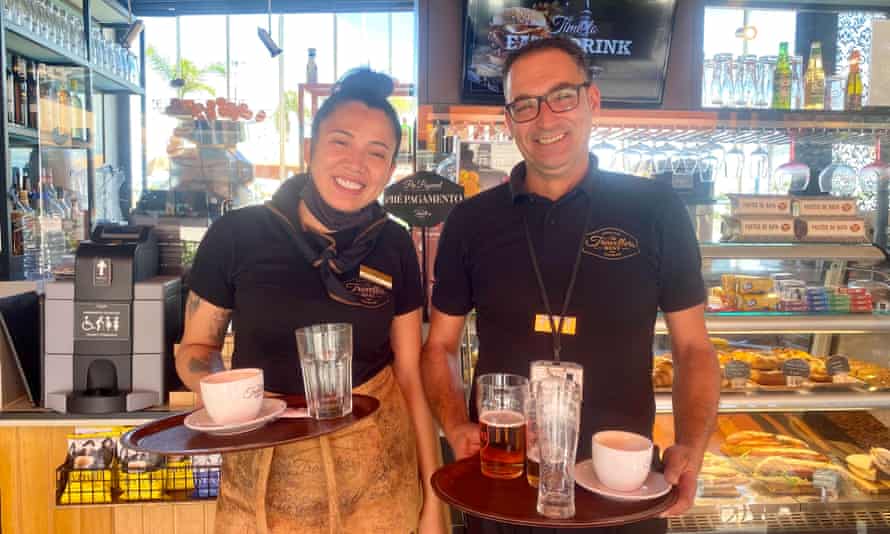The mood at Faro airport was buoyant. Camera operators and photographers jostled to take pictures of smiling tourists, perhaps not as many as hoped, for but more are on the way. João Fernandes, head of the Algarve tourism board, was there, too, greeting arrivals while his staff handed out face masks, hand gel and sprigs of lavender.
“I feel good,” said Fernandes. “The British tourists are a very big part of our economy. In 2018 half of the passengers coming through this airport were from the UK. They stayed for six million overnights out of a total of 16 million for international visitors. And on our golf courses, 83% of visitors were British or Irish.”
Figures from Abta, the UK Travel Association, give the economic value of British tourism to the whole of Portugal in 2018 as half a billion pounds, but the Algarve is particularly reliant on tourism and for that reason the economic effects of the pandemic have been tough: unemployment has increased by 70% in the past year. In this seasonal economy, many workers simply stayed at home and waited for the long winter to come to an end.

Pedro Pires, a cashier in the Travellers Rest bar-restaurant outside the airport, shook his head remembering the six months that he went without work. “Everything just stopped quite suddenly,” he said, pointing towards the main exit of the airport. “There was nobody coming out that door.” Eventually the bar closed for six months and all he had to survive on was a government subsidy of €650 a month. “It was very difficult,” he said. “It was not enough. We haven’t bought anything new: no shoes or clothes. I’ve been mending my T-shirts!”
Pires’ friends were forced to move house, sharing accommodation and visiting food banks in order to survive. His co-worker Layara Matias had an even harder experience: “I went back to my home town of Belém in Brazil just before the pandemic, only to visit my family for a few days, but I got trapped there for five months.”
In that time her entire family caught Covid. “But thank God we all survived,” she said. When she finally got back home to Portugal, she discovered friends from outside countries had been forced to leave. “It’s a pity, but we have lost touch with many people.”
I asked Matias if there were any benefits to the pandemic. She shrugged. “The only good thing was spending more time with my family.”

Others, however, have seen advantages to the long quiet period. Arlindo Serrão, from Portugal Dive, who I also met at the airport, said: “Dive operators I know have been busy doing videos, photography and building better communications. Previously they never had time for that kind of thing.”
That is something that Fernandes emphasised, too. “By training, I’m an environmental engineer and the pandemic has given us opportunity to work on important aspects, such as water resources and renewable energy. We have water parks that have switched from fresh water to sea water; we’ve improved water use on golf courses and we’re working hard on wastewater treatment.” The Algarve has received €200m in EU grants for these projects.
Serrão believes that this rethink came at a vital time: “The Algarve was an exclusive place when I was growing up here in the late 1960s and early 70s, but after the 1974 revolution there was a rush to develop and a lot of it was not well planned.”
I witnessed that rush myself in the 90s: beaches where you had to walk into the sea to move along a beach because they were jammed with sun worshippers.
“The pandemic has given us chance to think about what kind of Algarve we want and start moving towards that,” said Serrão. “There are still places that are tranquil and unspoiled. We’re hoping that development now can be more careful, more deliberate. The pandemic has certainly brought change.”
All over Portugal the pandemic has forced businesses to change. Some old-fashioned enterprises have leaped forward into the digital age, propelled by necessity. In Lisbon pasteis de nata, the traditional custard tarts, are now Uber-delivered from Pastéis de Belém, a bakery that has been going since 1837. Serrão laughed: “My own local grocery store, which was very old-fashioned and run by an elderly couple, has even started deliveries.”
“You order online?” I asked.
He laughed: “No, come on. That would too much for them. It’s by phone.”
For Matias the resumption of flights from Britain is hugely significant. “The British come here and like to relax and spend money,” she said, smiling broadly. “We appreciate that. I feel happy. I hope that today is the beginning of normality.”





